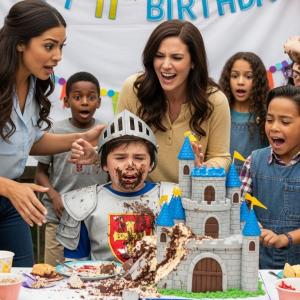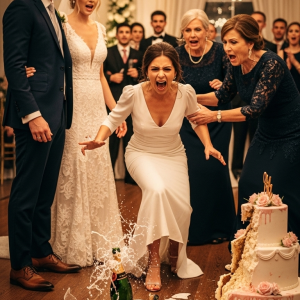My name is Nicole, and for twelve years, I prided myself on being the kind of nurse who put her patients’ well-being above her own. Every morning, I’d arrive at 5 a.m., two hours before my shift, just to sit with Mr. Garner, who got anxious before sunrise. When a dying patient’s family couldn’t afford to fly in, I used my vacation fund to buy their tickets. My supervisor, Meredith, always took advantage of that dedication.
She’d assign me the toughest cases because she knew I wouldn’t complain. When families wrote glowing reviews about the compassionate nurse, Meredith filed them under her own achievements. She started presenting my pain management protocols as her own innovations at board meetings. I worked unpaid overtime constantly, while she marked it as “voluntary” on the time sheets. I told myself it was for the patients.
Things changed when my daughter, Kayla, was diagnosed with leukemia. She was only 12. Suddenly, our life became a blur of chemo appointments, blood draws, and sleepless nights. I asked Meredith for an adjusted schedule. She made a big show of sighing and talking about budget constraints before reluctantly agreeing.
Then, the harassment started. During Kayla’s very first chemo session, Meredith called me seven times about “urgent” matters that turned out to be routine paperwork. She’d schedule “emergency” meetings that forced me to leave treatments early. She’d even text me photos of messy supply closets during Kayla’s spinal taps, demanding immediate reorganization.
I made it work. I compressed 16-hour shifts around Kayla’s needs, living on caffeine and adrenaline. I’d hold Kayla’s hand during chemo while fielding Meredith’s calls about which printer paper to order. The worst part was watching Kayla try to be brave. She’d squeeze my hand when the nausea hit and whisper, “It’s okay, Mom. Take your call.” It broke my heart every single time.
The real betrayal came six months later, at an all-staff meeting. Meredith stood up in front of everyone and, through dramatic tears, announced that her son had also been battling cancer and she’d been keeping it private. She revealed he was finally in remission. The entire room erupted in applause. Management immediately offered her paid leave and bonuses for being so “strong.”
I sat there, completely frozen, because I knew for a fact that Meredith’s only child was a perfectly healthy 18-year-old freshman at a state college. I had seen him helping her move furniture just two weeks earlier.
The next few weeks were torture. Meredith received flowers and cards daily. The company newsletter ran a feature on her “inspiring journey.” She won the quarterly “Courage Award,” which came with a $5,000 bonus. Meanwhile, I had to contribute $20 to her celebration fund while I was selling my furniture on Craigslist to cover Kayla’s actual medical co-pays.
People constantly praised Meredith for working through such hardship. She’d dab at her eyes and talk about how her dedication to patients kept her going. During lunch, she’d show people fake prayer cards she’d had printed with her son’s picture and a made-up diagnosis. I wanted to scream.
Eight months after her diagnosis, Kayla finally went into remission. I sobbed with relief in the hospital bathroom before pulling myself together to finish my shift. All I wanted was to take her somewhere special, just a week at the beach to feel normal again.
I submitted my first real time-off request in three years. Meredith denied it immediately. She pulled me aside, her expression a mask of fake sympathy.
“I’m actually using that exact week for my son’s recovery trip to Europe,” she explained. The company, she added, was paying for it as part of her “support package.” She patted my shoulder. “I’m sure you understand, since you’ve been through the same thing.” Then she asked if I could cover her shifts while she was gone.
That night, Kayla asked me why other families got to celebrate when their kids got better, but we couldn’t. I didn’t have an answer that wouldn’t break both our hearts. A few days later, I saw Meredith’s son posting spring break pictures from Cancun—during his supposed chemo. I screenshotted everything. I was done being a doormat.
I marched straight to HR the next morning with a folder of evidence: the screenshots, the emails, the texts. The HR director flipped through my documentation, her frown deepening. When she got to the spring break photos, she set the folder down. She explained that social media posts weren’t “conclusive evidence” and reminded me that Meredith had been with the company for fifteen years. She suggested I might be “misunderstanding the situation due to my own stress.”
That afternoon, Meredith cornered me in the medication room. Her voice was sweet, but her eyes were cold. She’d heard about my HR visit. She reminded me that she controlled the schedule, the assignments, and my performance reviews. Then, she assigned me three back-to-back 12-hour shifts over Kayla’s 13th birthday weekend.
I worked those shifts. Kayla spent her birthday at her grandmother’s house. When I finally got home, I found her asleep on the couch, still wearing the party dress she’d picked out weeks ago.
The next week, Meredith moved me to the night shift without warning. This meant I’d miss Kayla’s follow-up appointments unless I stayed awake for 24 hours straight. My coworkers started avoiding me. The isolation was almost worse than the harassment.
Then, I met Johnny in the parking garage. He was a nurse from another unit, sitting in his car crying after his shift. Meredith had been his supervisor two years ago. His wife had miscarried, and when he’d asked for time off, Meredith had claimed she’d also just had a miscarriage. She’d gotten paid leave and flowers while he’d been written up for missing shifts to care for his grieving wife.
We sat in that parking garage for an hour, comparing notes. Johnny mentioned two other nurses who’d had similar experiences. The next day, I tracked down Victoria, one of the nurses he’d mentioned. She told me about how Meredith had claimed to have lupus right after Victoria’s own diagnosis, using it to get premium parking and flexible schedules while disciplining Victoria for taking time off for actual treatments.
I spent my lunch break researching the company’s whistleblower policies. That evening, Meredith announced she was organizing a charity run for childhood cancer awareness in her son’s honor. I watched my coworkers eagerly volunteer for committees, designing t-shirts with her son’s picture and the slogan “Survivor Strong.” I felt sick.
My breaking point came during Kayla’s three-month follow-up scan. I’d requested the morning off weeks in advance, but Meredith scheduled a mandatory department meeting for that exact time, claiming I’d never submitted the request. I presented new protocols with shaking hands while Kayla sat in a waiting room with her grandmother, waiting for the scan results that would determine if she remained cancer-free. I wasn’t there to hold her hand. I found out the scan was clear from a voicemail, which I listened to in my car while sobbing with relief and rage.
That weekend, I met with Johnny, Victoria, and Sebastian, another former employee Meredith had driven out. We sat in Victoria’s living room, surrounded by boxes of documentation spanning years of Meredith’s abuse. Together, we had enough evidence to show a clear, undeniable pattern. We compiled everything into a comprehensive, 200-page report.
The charity run was two weeks away. Meredith had arranged for her son to attend, to stand as a “symbol of survival.” But the day before the run, we submitted our report to the hospital board. We also sent copies to the regional healthcare oversight committee and the nursing board. If the hospital tried to bury it, we’d have external pressure.
The next morning, an unexpected twist. Meredith’s son posted on social media about his confusion regarding the run, mentioning he’d never had cancer. The post was deleted within an hour, but not before it was screenshotted and spread like wildfire. The whispers started. Meredith tearfully explained that her son was in denial, that trauma affected everyone differently. Some people bought it; others looked skeptical.
The morning of the charity run, Meredith called an emergency staff meeting, again explaining her son’s “cry for help.” As she spoke, Victoria and Sebastian were hand-delivering our documentation package to each board member’s office.
At 7:30 a.m., while I was finishing my deliberately brutal night shift, security appeared on my floor. I watched through the glass walls of Meredith’s office as her face changed from confusion, to anger, to something like fear. Fifteen minutes later, she emerged, flanked by security. As they passed the nurse’s station, she looked directly at me. The hatred in her eyes could have melted steel.
The head of administration announced that the charity run was postponed, pending an investigation into “serious allegations of fraud.”
The hospital launched a full investigation. Stories poured out. Meredith’s lawyer sent cease and desist letters, but the breakthrough came when her son agreed to speak with investigators. He was horrified and provided bank statements showing he’d been healthy and in college during his supposed cancer treatment. He also revealed that his mother had tried to pay him to play along.
Two weeks later, Meredith was terminated for gross misconduct, fraud, and creating a hostile work environment.
The hospital awarded me back pay for all the unpaid overtime—just under $8,000. It wasn’t a fortune, but it meant I could pay off some of Kayla’s medical bills and stop selling furniture.
But the best part was simply having my life back. I picked Kayla up from school on time. We ate dinner together. I slept for eight hours straight. Kayla noticed the change immediately. She started smiling more, making plans with friends again.
Three months later, the nursing board revoked Meredith’s license. She would never practice again. I ran into Johnny in the hospital cafeteria; he’d transferred back to our unit and showed me pictures of his wife’s new pregnancy, their rainbow baby. Victoria sent me a message that she was returning to nursing full-time.
On the one-year anniversary of Kayla’s remission, we finally took that beach trip. We built sandcastles, ate ice cream for breakfast, and played in the waves. Kayla fell asleep on my shoulder during the drive home, sunburned and happy.
I returned to work refreshed. The unit felt different. Nurses collaborated instead of competed. The interim supervisor encouraged innovation and actually credited the right people.
Last week, I picked Kayla up from school, and we went for ice cream. She told me about her science project and her plans for summer camp. Her health was stable, her grades were recovering, and she was just a normal 13-year-old. It was everything I had fought for. As we walked home, Kayla slipped her hand into mine. She didn’t say anything, just squeezed gently. I squeezed back, thinking about all the hands I’d held during my career, but this one mattered most. This one had given me the strength to stand up to a predator and reclaim our lives.
A month after Meredith was fired, things at the hospital finally started to settle. The dark cloud that had lingered over the unit for years lifted in slow, noticeable ways—jokes at the nurse’s station, coworkers actually taking breaks without fear, new hires not walking on eggshells their first week.
The interim supervisor, a woman named Clara with more empathy in her pinky finger than Meredith had shown in a decade, stopped by my station one morning.
“I heard you’re the one who pioneered the pain protocol that’s been helping the palliative unit,” she said, tapping a folder. “I’d like to officially credit you at next month’s leadership meeting.”
I blinked. “Sorry, what?”
She smiled. “You deserve recognition. It’s long overdue.”
I nodded slowly. It wasn’t about the credit—not really. But it felt good to finally be seen.
Later that week, I got an email from HR. They were inviting me to apply for a newly created role: Nursing Ethics & Staff Advocate, a hybrid position designed to address internal harassment, burnout, and system abuse—essentially, a position created because of everything we endured.
I didn’t say yes right away.
I sat with it for a few days. Talked to Kayla. She was lying on the living room rug, drawing something for art class.
“What do you think, baby?” I asked, reading the email aloud.
She looked up, blinking. “Are you gonna be helping other nurses not get hurt?”
I nodded.
She smiled, then went back to coloring. “Then I think you should do it.”
That was all the answer I needed.
I accepted.
The transition wasn’t easy—shifting from floor nursing to advocacy meant I wasn’t always on the ground with my patients. But I had spent over a decade pouring myself into care at the bedside. Now, I had the chance to protect the caregivers themselves—to be the voice I once didn’t have.
In my new role, I started holding monthly roundtables with nurses, techs, and CNAs. A safe space. No hierarchy. Just open conversation. The first few meetings were quiet, full of suspicion. But by the third month, they were filled with real talk—about overwork, favoritism, burnout, grief, and the guilt nurses carry for not always being able to save everyone.
We changed things, slowly but surely. Introduced a buddy system for nurses going through personal crises. Pushed HR to implement mandatory empathy training for managers. Brought back mental health counselors. Reinforced protocols that prevented any one supervisor from holding too much unchecked power.
Meredith’s ghost still lingered in some corners. But I was there now—to make sure it didn’t grow back into a monster.
Kayla started volunteering at a local animal shelter on weekends. She fell in love with a golden retriever named Basil and begged me to adopt him. I caved.
Our tiny apartment felt warmer with Basil around. He followed Kayla everywhere, even sleeping at her feet. On hard days, when work felt heavy or my body remembered the toll of years of overexertion, Basil would lay his head in my lap and Kayla would press a mug of tea into my hand like she was the mom.
She was growing up. Strong. Healthy. Whole.
One night, we sat on the fire escape watching the stars. Kayla leaned her head against my shoulder.
“Do you ever miss working the hospital floor?” she asked.
“Sometimes,” I said. “But I’m glad I’m doing what I do now.”
“Do you think Meredith is okay?”
That surprised me.
I looked at her. “Why do you ask?”
“I don’t know. I just… wonder if people like that ever stop being mean.”
I was quiet for a moment. “Maybe. But only if they want to. And I don’t think she wanted to.”
Kayla nodded like she understood more than she should. She always did.
“I’m glad you stood up to her,” she said. “Even if it was scary.”
“I was terrified,” I admitted.
“But you did it anyway.”
I looked down at her. “I did it for you.”
She smiled. “And a little for you, too.”
She was right.
A year passed.
The hospital offered to name the new staff wellness program after someone. People nominated me.
I declined.
Instead, I suggested naming it after Kayla. Not because of what she endured—but because of what she inspired. I didn’t want people to think of pain or illness when they heard the name. I wanted them to think of resilience. Of bright eyes and goofy laughter and the strength it takes to hope.
The Kayla Program launched that spring. It included paid emergency leave, anonymous abuse reporting channels, and mentorship for nurses in crisis.
One day, as I walked past the front lobby, I saw a young nurse staring at the plaque by the entrance.
She turned to me. “Are you the Nicole?”
I smiled. “Depends. Am I in trouble?”
She laughed nervously. “No, I just… I read about the whistleblower stuff. The program. I started here a few months ago, and I just wanted to say thank you.”
I nodded. “You’re welcome. And you’re safe here. If anyone makes you feel like you’re not—my door’s always open.”
She smiled wide, almost tearful. “You have no idea how much that means.”
Actually, I did.
That night, I came home late. Kayla had fallen asleep on the couch again, her schoolbooks scattered around her. Basil lifted his head as I entered, tail thumping once before drifting back to sleep.
I tucked a blanket over Kayla and kissed her forehead. She stirred slightly, mumbling something about science homework.
I turned off the lights and stood by the window, looking out over the quiet city. The weight of years still lived in my bones, but it wasn’t crushing anymore. It was a reminder—a scar I wore proudly.
Justice hadn’t come fast, or easy, or clean. But it came. Because we fought for it. Because we refused to be silent.
My name is Nicole.
I am a mother.
I am a nurse.
And I am no longer afraid.




